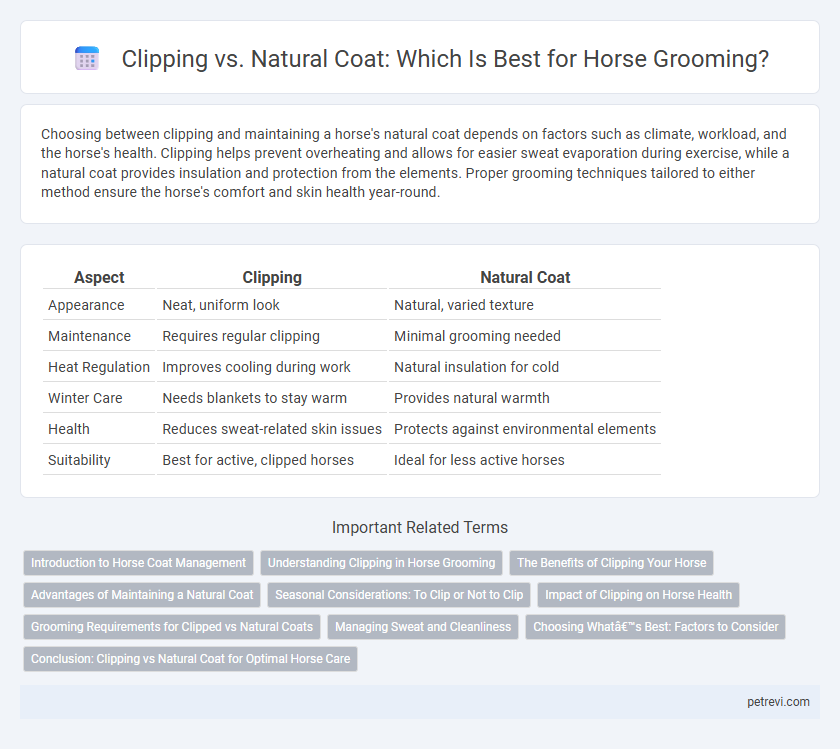Choosing between clipping and maintaining a horse's natural coat depends on factors such as climate, workload, and the horse's health. Clipping helps prevent overheating and allows for easier sweat evaporation during exercise, while a natural coat provides insulation and protection from the elements. Proper grooming techniques tailored to either method ensure the horse's comfort and skin health year-round.
Table of Comparison
| Aspect | Clipping | Natural Coat |
|---|---|---|
| Appearance | Neat, uniform look | Natural, varied texture |
| Maintenance | Requires regular clipping | Minimal grooming needed |
| Heat Regulation | Improves cooling during work | Natural insulation for cold |
| Winter Care | Needs blankets to stay warm | Provides natural warmth |
| Health | Reduces sweat-related skin issues | Protects against environmental elements |
| Suitability | Best for active, clipped horses | Ideal for less active horses |
Introduction to Horse Coat Management
Horse coat management plays a crucial role in maintaining equine health and performance, balancing natural growth with practical grooming techniques. Clipping removes excess hair to regulate body temperature and reduce sweat buildup during intense exercise, while a natural coat provides insulation and protection against weather conditions. Selecting between clipping and allowing a natural coat depends on factors such as climate, workload, and individual horse needs to optimize comfort and hygiene.
Understanding Clipping in Horse Grooming
Clipping in horse grooming involves trimming the horse's coat to manage sweat and maintain a clean, healthy skin surface during intensive work or colder seasons. This practice helps prevent overheating by enhancing sweat evaporation and reduces the need for excessive blanketing, which can cause discomfort or skin issues. Understanding clipping techniques and timing is essential to balance maintaining natural coat benefits while promoting horse comfort and hygiene.
The Benefits of Clipping Your Horse
Clipping your horse promotes better hygiene and reduces the risk of skin infections by removing excess hair that traps dirt and sweat. It helps regulate body temperature during intense exercise or in warm weather, preventing overheating and improving performance. Clipped horses also require less grooming time, allowing for easier maintenance and quicker drying after workouts.
Advantages of Maintaining a Natural Coat
Maintaining a natural coat in horse grooming preserves the horse's natural insulation, aiding in temperature regulation during both winter and summer months. A natural coat supports the horse's skin health by reducing the risk of irritation and promoting natural oils that protect against environmental factors. This approach minimizes the need for frequent clipping sessions, lowering stress and promoting overall wellness in the horse.
Seasonal Considerations: To Clip or Not to Clip
Clipping a horse's coat during winter can prevent excessive sweating and reduce the risk of chills after exercise, making it ideal for horses in heavy work or those living in stalls. However, horses with natural coats benefit from the insulation against cold weather, which supports their natural thermoregulation and reduces the need for blankets. Seasonal considerations such as climate, workload, and the horse's living environment are critical factors in deciding whether to clip or maintain a natural coat.
Impact of Clipping on Horse Health
Clipping a horse reduces the natural insulation provided by its coat, potentially increasing vulnerability to cold stress and respiratory issues, especially in colder climates. Horses with clipped coats require more frequent grooming and careful management of blankets to maintain optimal body temperature and prevent skin irritation. However, clipping can prevent excessive sweating and reduce the risk of bacterial infections associated with damp, thick coats during intense exercise or in humid environments.
Grooming Requirements for Clipped vs Natural Coats
Clipped horses require more frequent grooming to prevent skin irritation and to manage sweat buildup since their natural protective layer is removed. Natural coats provide insulation and protection against elements but demand thorough brushing to remove dirt, loose hair, and to stimulate oil production. Proper grooming techniques vary significantly, with clipped horses benefiting from moisturizing products and natural-coated horses needing consistent brushing to maintain coat health.
Managing Sweat and Cleanliness
Clipping a horse's coat significantly reduces sweat retention during intense work, preventing excessive moisture buildup that can lead to skin irritations and fungal infections. Natural coats provide insulation but trap sweat and dirt, requiring thorough grooming to maintain cleanliness and avoid discomfort. Efficient management of sweat and hygiene through clipping ensures better health and quicker post-exercise drying times compared to relying solely on a natural coat.
Choosing What’s Best: Factors to Consider
When deciding between clipping and maintaining a natural coat for horse grooming, consider factors such as climate, workload, and the horse's health. Clipping helps regulate body temperature during intense exercise and cold weather, reducing sweat buildup and preventing skin issues. Conversely, leaving the natural coat intact supports natural insulation and protection, especially in milder conditions or for horses with less demanding routines.
Conclusion: Clipping vs Natural Coat for Optimal Horse Care
Clipping a horse's coat enhances comfort during intense exercise and reduces drying time, improving overall hygiene and performance. Maintaining a natural coat preserves the horse's natural insulation and UV protection, ideal for less active horses or colder climates. Optimal horse care depends on activity level, climate conditions, and individual skin sensitivity, balancing grooming frequency with health and comfort needs.
Clipping vs Natural Coat for Horse Grooming Infographic

 petrevi.com
petrevi.com